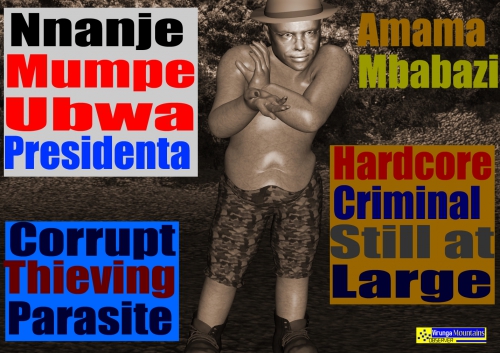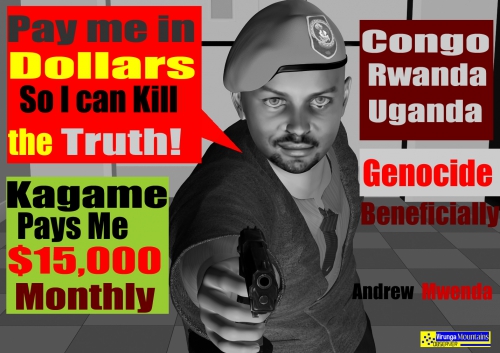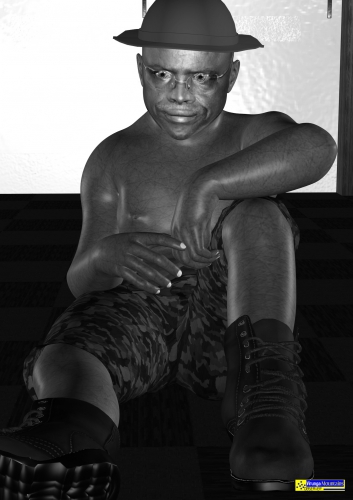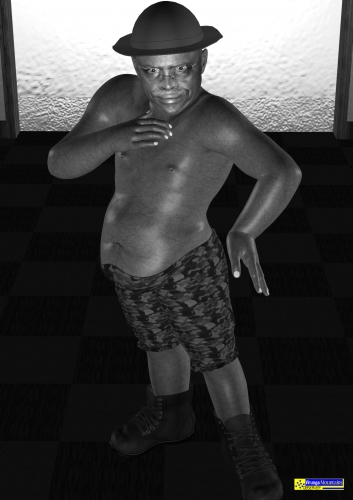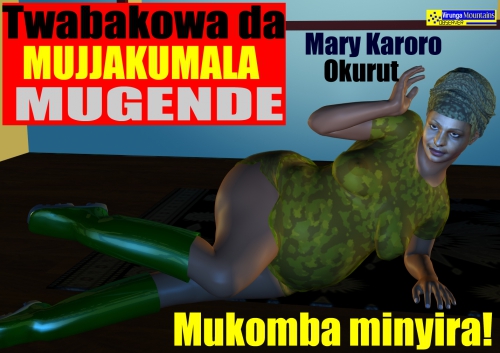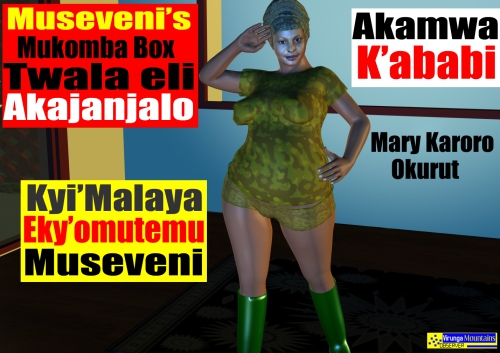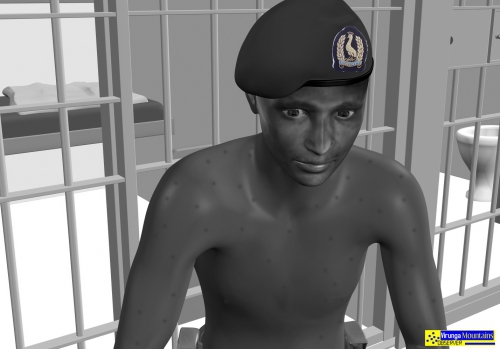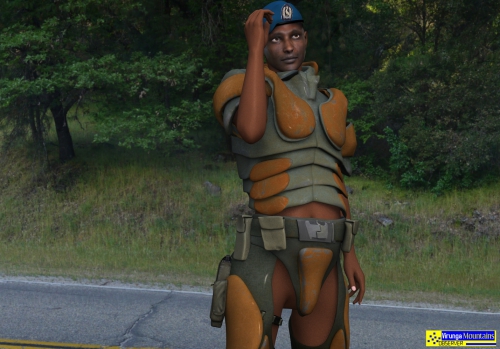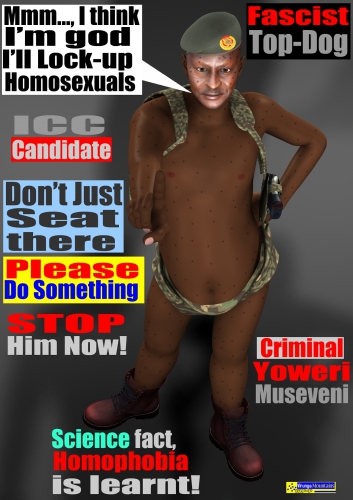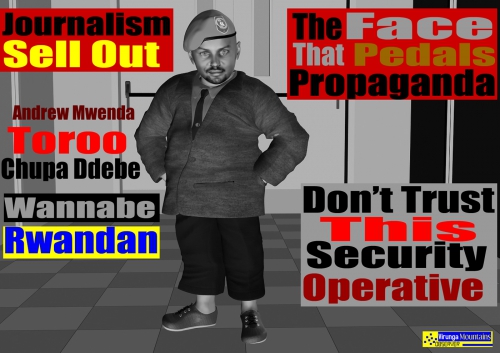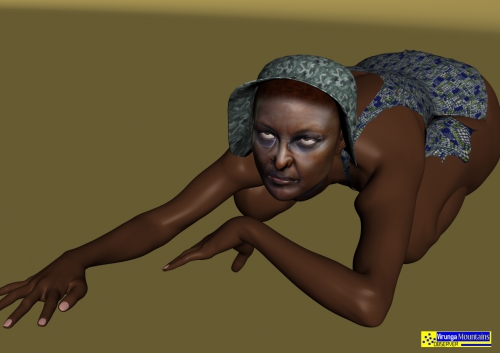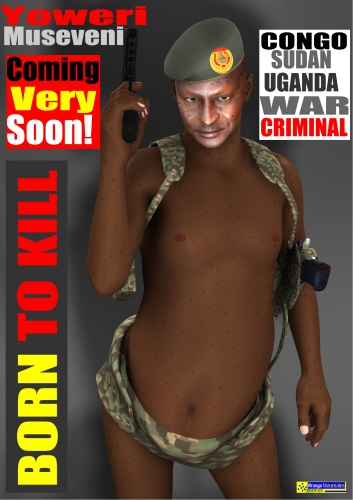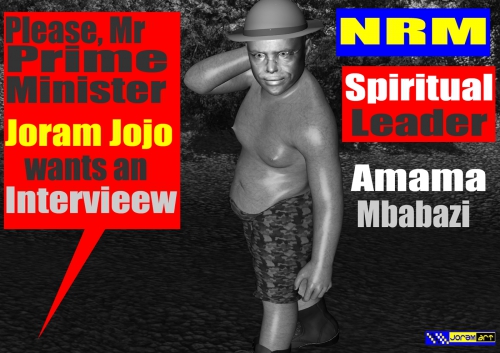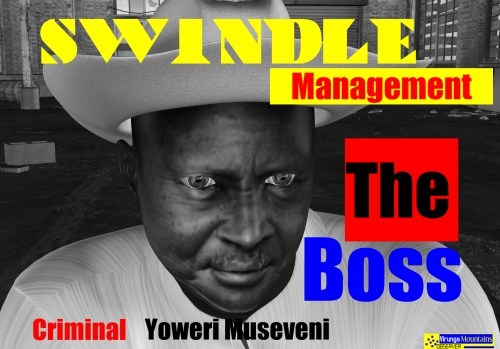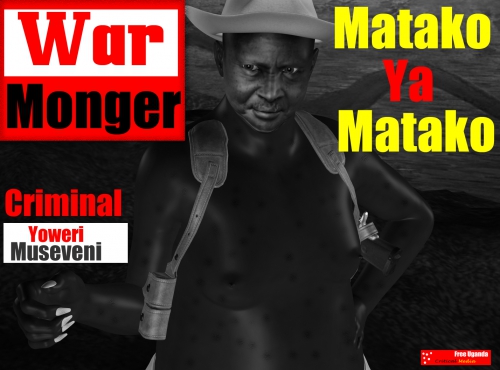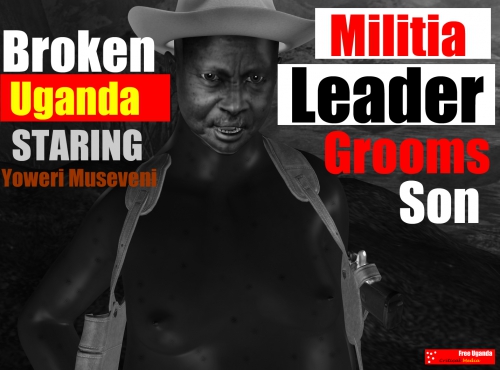Fellow Compatriots, just think of the number of powerful people from Kigezi region that are squatting in Kampala indulging themselves in Kachabali and behaving like they’re the most civilised/Sophisticated, caring, extrovert, high morels, etc.
museveni
-
Uganda Continues to be run by a Corrupt Political Class
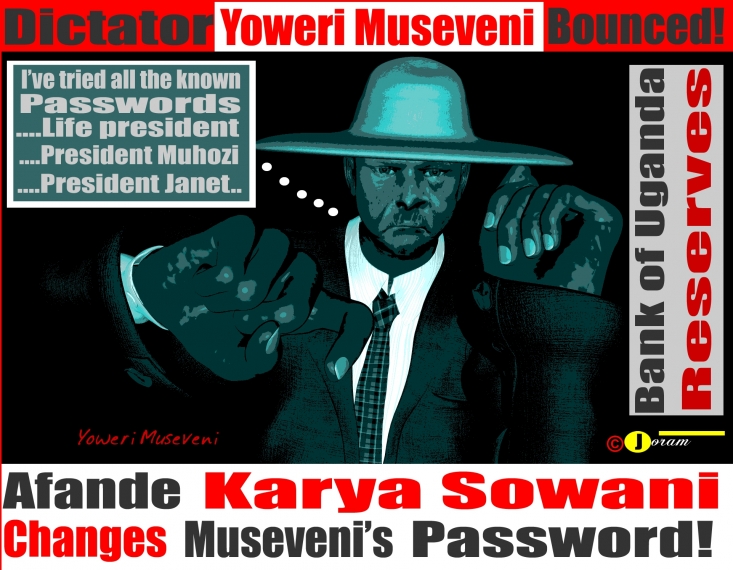
-
How Parasite, Amama Mbabazi Rose and Fell in three Days
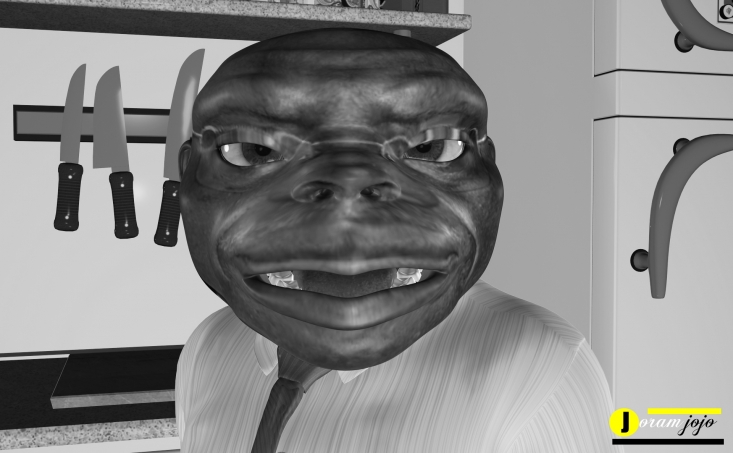
We don’t sacrifice our-time to write about Uganda Politicians because we’re radicals or hate people, but its our duty to inform Ugandans that might not have access to a different point of view or insight in the workings of the Uganda political Mafioso class.
-
Uganda Art in the corridors of Power
The political scene in Uganda is always stage managed by a monopolistic media establishment that is controlled and managed by Yoweri Museveni's autocracy.
What we're fed on is what the regime plants in the press for Ugandans to consume, but rarely do our people read and analyse what is behind the story.
That's why its imperative for citizens to disseminate the truth and facts according to the way they see them-the truth should always be told and not ride on a propaganda bandwagon of the state.
The one thing that disturbs me, is the chronic thieving nature of Amama Mbabazi, apart from being a thief and parasite on Ugandans, what use is he to the people of Uganda??
This is a cheap fellow that sells milk on twitter-not mentioning his corrupt wife-Jacqueline Mbabazi that brought down the Army enterprise especially when the army was still in its infancy and recovering from battle trauma-apparently she's now a Criminal Yoweri Museveni's special adviser on special duties. What a bunch of criminals!!!
The political scene in Uganda is being pampered by all sorts of opportunistic individuals that have only one agenda-steal,divide Ugandans,confuse Ugandans,enslave Ugandans,Kill Ugandans, and destroy Uganda.
But what they failed to understand is that, Uganda has always been there and they'll leave it behind but very bruised-Many of them will end up in ICC or similar institutions to answer for crimes against Humanity.
With no doubt, Kare Kayihura should be behind bars for horrendous crimes against Humanity committed in Congo Democratic Republic and Uganda. But as the saying goes, justice never decays.
The heavy weight of war criminals,Yoweri Museveni knows that his time is around the corner as his portfolio for crimes against humanity is already full and waiting for a wise and courageous prosecutor-to lock him up and throw away the key.
What is so sad, is when security operatives impose themselves on Ugandans as Journalists and Human rights activists and later at night they retire to bed with the dictatorship of both Uganda and Rwanda.
Then we have a full-time career parasite, called Janet Museveni that grabs anything as long as she can trade it for a dime.
The worst thing that can happen to a people is to be enslaved by a ruthless,arrogant and backward autocrat like Yoweri Museveni. The thug just kills people,imprisons them and then steals the little they have.
What I've heard from some circles of Ugandans, especially the twasoma(elite) is indeed- they feel the pain but are waiting for outsiders to come and rescue them. Very wrong.....outsiders can only come on your side when they see that you're also doing something and not just fantasies. The Liberation for Uganda should be today and not tomorrow as time is not on our side.
Those criminals running Uganda are the best cowards and that's why they're always surrounded with guns for protection-its only cowards like them that will find the first exit when the people rise-up. What Ugandans should understand is that, the army is also suffering like the rest of Ugandans and its just a clique of few criminals that are using and giving them a bad name.
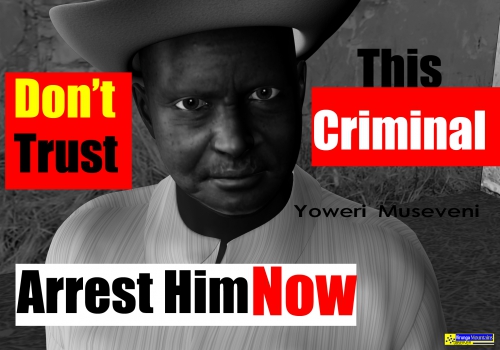
To Be continued
-
Has Yoweri Museveni Got away with Crimes against Humanity?
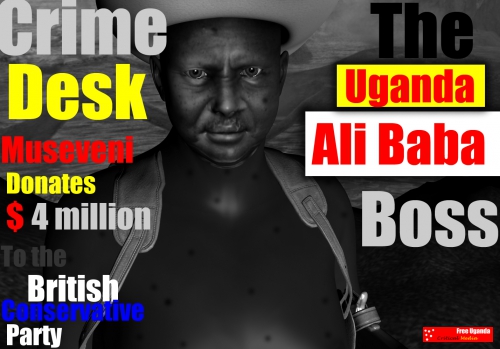
Today we see an aggressive PR machine trying to rehabilitate and market this hardcore criminal to society-like some saint. Yes, today if its not BBC,Aljazeera,etc. its the shameless greedy american establishment. We should not also forget the 3 Millions(US)$ being paid to an Irish gang by Uganda Taxpayers to clean Criminal Museveni's blood, whenever it starts spilling .
Both Paul Kagame and Yoweri museveni having murdered 6 million Congolese in cold blood, now its this criminal duo that are blaming the Congolese for poor management of their country, and are offering western powers consultancy/ solutions for Congo. This is very insulting to those 6 million Congolese that have been massacred by the same thugs. If those powers want to keep their criminals, let them go ahead but stop insulting Congolese people.
What is so disturbing about Museveni's Crimes against humanity, is the extent that, some powerful forces love a character like him. Yes, a brainwashed butcher that does all the dirty work can be relied upon as long as Africa is there to be plundered left-central,right, and south.
We also have a culture of greed and opportunism among the African Political elite that is addicted to a patronage Modus Operand on society; this parasitic class acts as cheerleaders, and kingpins to state criminals and has mastered the art of managing corruption and cover-ups.
This pathetic political class can be found both in Uganda and diaspora-human rights ,rule of law,justice and social development means nothing to them, as long as they can be given a position to milk sleepy Ugandans.
Can this criminality and impunity be sustained forever?
Of-course not, because no criminal cartel has ever outlived human blood, and especially when its in millions. The right-time will come to bring Criminal Museveni and his accomplices before justice-the people's justice like the one we saw criminal Muammar Gadaffi facing, is what scum bugs like Museveni,Kagame, etc. deserve and nothing less.
This day is not that far as Uganda is soon going to face a nasty political check-out!!!!
-
Arrest Yoweri Museveni and Paul Kagame
o
 Yoweri Museveni and Paul Kagame, planed and funded for systematic murder of a group of people in Congo
Yoweri Museveni and Paul Kagame, planed and funded for systematic murder of a group of people in CongoThe AFDL/APR troops indiscriminately killed men, women and children. Most of the victims were Hutu Banyarwanda, but many Nande were also massacred at Buhimba. According to several survivors, the AFDL/APR soldiers killed several children by dashing their heads against walls or tree trunks. In all, 334 victims were recorded. 341
 Thousands of Children were enslaved and taught to kill for Yoweri museveni and Paul Kagame
Thousands of Children were enslaved and taught to kill for Yoweri museveni and Paul Kagame The vast majority of incidents listed in this report could, if investigated and proven in a judicial process, point to the commission of prohibited acts such as murder, wilfully causing great suffering, or serious injury to body or health, rape, intentional attacks on the civilian population, pillage, and unlawful and arbitrary destruction of civilian goods, including some which were essential to the survival of the civilian population.
The vast majority of these acts were committed against protected persons, as defined in the Geneva Conventions, primarily people who did not take part in the hostilities, particularly civilian populations and those put out of combat.
This report shows that the vast majority of incidents listed, if investigated and proven in a judicial process, fall within the scope of widespread or systematic attacks, depicting multiple acts of large-scale violence, apparently carried out in an organised fashion and resulting in numerous victims. Most of these attacks were directed against non-combatant civilian populations consisting primarily of women and children. As a consequence, the vast majority of acts of violence perpetrated during these years, which formed part of various waves of reprisals and campaigns of persecution and pursuit of refugees, became collectively, a series of widespread and systematic attacks against civilian populations and could be found by a competent court to constitute crimes against humanity.
-
Arrest Yoweri Museveni for War Crimes
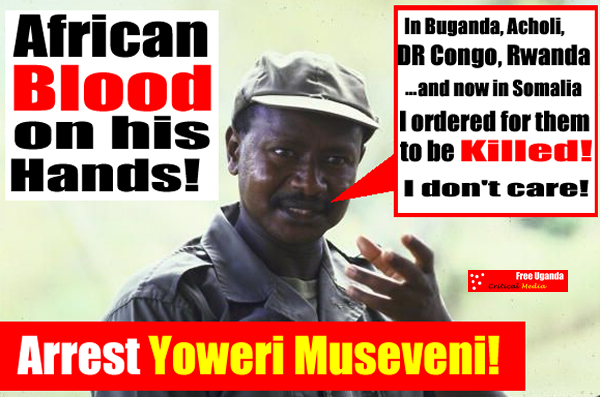
What happened to the hundreds of children that were in NRA(Now UPDF) and sent to Mubende. Where are all those children that In 2005, escaped or were captured or released from the LRA and pressured to join Yoweri Museveni's forces and fight the LRA. Where are they now? Why is Salim Saleh, a UPDF officer believed to have been banned from traveling to the United States over the UPDF’s role in the plunder of mineral resources from the DR Congo in the late 1990s, still a Cabinet Minister?
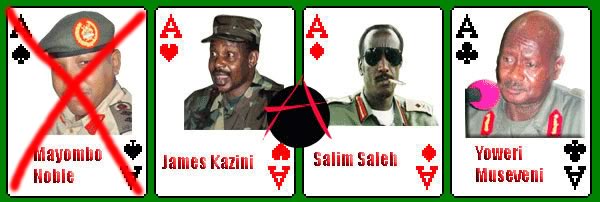
Why should a Killer and thief like yoweri Museveni, still be roaming western Capitals when the evidence is there for his arrest. Why should Sudanese Omar Bashir be wanted by ICC and Not Yoweri Museveni that has commited even worse crime?
See Illegal exploitation of natural resources and other forms of wealth of the DR Congo
Why should Darfur(less than 1000 dead) be called a genocide and not DR congo(6million dead).
Very simple. Yoweri Museveni is a western client and Omar Bashir a chinese client.
I'm not a big person on the world stage but big men like Alison Des Forges, Senior Advisor at the Africa Division of Human Rights Watch. said:"Uganda sent its troops into Congo supposedly to assure its own security, but in the process, it has caused greater insecurity for its unfortunate neighbors," said Alison Des Forges, Senior Advisor at the Africa Division of Human Rights Watch. "Pulling out some of its troops does not relieve Uganda of the responsibility for investigating and punishing the soldiers who have been involved in these crimes."
Des Forges said that Congolese leaders, including the heads of political factions and organizers of militias, have also violated the rights of their fellow citizens in Ugandan-dominated zones. The Ugandans trained local combatants who were recruited by rival political leaders on the basis of personal or ethnic loyalty, and who were more likely to be used for local advantage than in the war against the Congo government. Both the Ugandans and leaders of the Congolese Rally for Democracy-Liberation? Movement (RCD-ML) recruited and trained children as combatants. In August 2000 Uganda airlifted 163 children from Congo to Kampala for military training.
"Uganda has repeatedly promised to end the use of child soldiers, yet here it is openly teaching Congolese children to make war," said Des Forges. "When does it plan to start making good on these promises?" Congolese political leaders in the Ugandan-controlled region have detained rivals, held them in inhumane conditions, and sometimes tortured them. Ugandan soldiers have similarly abused Congolese whom they have identified as opponents. Ugandan authorities in mid-2000 approved an alliance between RCD-ML leader Mbusa Nyamwisi and Mai-Mai?, a local militia hostile to foreign occupiers, and even arranged to provide military training for them. Later, Ugandans rejected the arrangement and began fighting the Mai-Mai?. In subsequent conflicts, Ugandan troops captured and summarily executed Mai-Mai? combatants. They also attacked local people thought to have aided the Mai-Mai?, killing civilians and laying waste their villages. Ugandan soldiers also backed the RCD-National, supposedly another rebel political movement but apparently really an operation to extract and market the rich mineral resources of the Bafwasende area.
"Ugandan soldiers have blatantly exploited Congolese wealth for their own benefit, and that of their superiors at home," said Des Forges. "In competing for control of Congo's phenomenal resources, the Ugandans as well as other parties to this war have committed countless atrocities against the Congolese population."
Unless the International Criminal Court is also part and parcel of Yoweri Museveni's African Genocide project, set out under article 15 of the Rome Statute of the International Criminal Court,an investigation proprio motu by undertaking a preliminary investigation of serious crimes committed in Ituri within the presumptive jurisdiction of the ICC for possible prosecution.
The Front for the Liberation of Congo in Ugandan occupied areasThe Movement for the Liberation of Congo (Mouvement pour la Liberation du Congo, MLC), headed by Jean-Pierre? Bemba, controls much of Equateur province in the north. By early 2001, it had established its sway over another, less well organized rebel group, the Congolese Rally for Democracy-Liberation? Movement (Rassemblement Congolais pour la Democratie-Mouvement? de Liberation (RCD-ML), which claimed to control parts of North Kivu, and Orientale provinces in eastern Congo. Uganda engineered this merger among its Congolese rebel allies to unify their military against the government alliance, and to shield it from increasing international scrutiny of its role in manipulating local political divisions and ethnic conflicts as a means of consolidating its control over these resource rich areas.
Uganda reacted angrily to the release in mid April of the report of the U.N. Panel of Experts on the Exploitation of National Resources and other Forms of Wealth of the DR Congo, threatening at one point to withdraw from the Lusaka peace process. Under international prodding, Uganda dropped the threat and committed to withdraw its troops from the country, saying that they have accomplished their mission of defeating the insurgent Allied Democratic Forces (ADF).
Human Rights Watch in March 2001 published the report "Uganda in Northeastern DRC: Fueling Political and Ethnic Strife" which documented the following abuses in areas occupied by Uganda near the border between Uganda and the DRC:
Ugandan military forces have played a decisive role in local affairs, even changing administrative boundaries and designating provincial officials, taking advantage of an administrative void resulting from continuing disputes among the various offshoots of the Ugandan- sponsored RCD-ML.
Within the context of the broader war and the continuing political conflicts, a small-scale dispute over land between Hema and Lendu peoples in northeastern DRC, one of many which previously appeared to have been settled peacefully, grew in scale and intensity. The Hema were thought to enjoy general support from the Ugandans, attributed to a supposed ethnic bond between the Hema of the DRC and those of Uganda. >From the first violence in June 1999 through early 2000, an estimated 7,000 persons were killed and another 150,000 were displaced. In the most recent incident of violence in January 2001, another 400 people were killed during one day of violence in Bunia and at least 30,000 people were forced to flee the region.
The perception that the Ugandan army supported the Hema was made real in many communities by Ugandan soldiers who helped Hema in defending their large farms against Lendu attack and who helped Hema militia attack Lendu villages. In some cases, these soldiers provided support in return for payments to themselves or their superior officers. In at least one case, Ugandan soldiers also assisted Lendu in attacking Hema. In one reported clash Ugandan soldiers backing different sides engaged in combat against each other. The assistance of Ugandan soldiers as well as the provision of training and arms to local forces resulted in a larger number of civilian casualties in these conflicts than would otherwise have been the case.
Under the guise of creating an army for the rebel movement, Congolese political leaders developed their own groups of armed supporters, bound to them by ties of personal and/or ethnic loyalty. On several occasions in the last two years, these armed supporters have engaged in operations in which civilians were killed. Uganda trained these groups even when it seemed likely that they would be used in local ethnic and partisan conflict rather than as part of a disciplined military force.
All parties, including the Ugandans, recruited and trained children to serve as soldiers. In August 2000 Uganda transported some 163 children, part of a larger group of 700 recruits, to Uganda for military training. Only in February 2001 did the government of Uganda grant various international agencies access to these children with a view to their demobilization and resettlement.
Contending RCD-ML political leaders Wamba dia Wamba and Mbusa Nyamwisi as well as Uganda People's Defence Force (UPDF) soldiers have illegally detained political leaders whom they have identified as opponents and held them under inhumane conditions. In some cases the UPDF and RCD-ML forces have tortured political opponents in detention.
The RCD-ML's "prime minister" Mbusa Nyamwisi, a local leader from a third powerful ethnic group, the Nande, sought to increase his power base by allying with Mai-Mai? forces, groups of local militia who had been fighting largely to expel foreign occupiers of their territory. Originally ready to tolerate this alliance, the Ugandans then rejected it. In subsequent conflicts with the Mai-Mai?, Ugandan forces as well as Congolese rebels loyal to Mbusa extrajudicially executed captured Mai-Mai? combatants. Subsequently, the UPDF attacked local people thought to have assisted the Mai-Mai?, killing civilians and laying waste to their villages.
Ugandan soldiers also formed and supported the front organization called RCD-National, which appeared to be an operation to extract and market the rich mineral resources of the Bafwasende area rather than the political party which it claimed to be. This blatant exploitation of Congolese wealth for the benefit of both locally based and other more highly placed Ugandan military officers symbolized the larger exploitation of the whole region for the benefit of outside actors.
Proxies Pursuing Their Own Interests
Ituri is home to eighteen different ethnic groups, with the Hema/Gegere71 and Lendu/Ngiti72 communities together representing about 40 per cent of the inhabitants. The other major groups are the Bira, the Alur, the Lugbara, the Nyali, the Ndo-Okebo?, and the Lese. With ethnic identity of growing importance, a new group has emerged, the "non-originaires"73, that is, `outsiders' who were not born in Ituri. The Nande of north Kivu represent the most prominent of the "non-originaires", due to their importance in the business sector. The emergence of Mbusa Nyamwisi, a Nande, as the leader of the RCD-ML raised the profile of the Nande in Ituri. Hema elites seeking to assert or protect their control of the political and economic spheres in Ituri tend to consider the Nande as direct competitors.
The Hema, Lendu, and other ethnic groups that serve as proxies for governments and rebel movements also seek to set agendas that serve their own interests. They are skilled at playing off the various outside rivals and change sides as their interests dictate. They adapt rapidly to developments on the national scene, working on the basis of the enemy of my enemy is my friend-at least for the moment.
Who Was Who - Armed Political Groups in Ituri
RCD-ML: Congolese Rally for Democracy- Liberation Movement
Current Leader: Mbusa NyamwisiAlso know as RCD-Kisangani, the RCD-ML was launched in September 1999 in Kampala when Wamba dia Wamba split from the RCD-Goma. Backed at the start by Uganda, the RCD-ML has been fractured by leadership struggles and in-fighting. The current leader, Mbusa Nyamwisi took power after ousting Wamba dia Wamba. The RCD-ML's military wing is the Congolese Popular Army (APC). The RCD-ML entered into the Sun City agreement of April 2002 and the APC are now being trained and armed by Kinshasa.
MLC: Movement for the Liberation of Congo Current Leader: Jean-Pierre? BembaBased in Gbadolite, the MLC has been backed by Uganda since the start of the war in 1998 although there have been occasional differences between the two. The MLC tried twice to establish a foothold in Ituri: in 2001 Bemba had nominal control of the short-lived FPC coalition of Ugandan- backed rebel groups and in 2002 the MLC attacked Mambasa in western Ituri but were forced backed by the APC of Mbusa Nyamwisi. The MLC has occasionally fought alongside the UPC and has been a rival of Mbusa's RCD-ML.
RCD-National: Congolese Rally for Democracy - National
Current Leader: Roger LumbalaNow based in Watcha, northern Ituri, the RCD-N initially operated as a front organization for the Ugandans in exploiting the diamond riches of the town of Bafwasende. In 2001 and 2002, the RCD-N supported MLC attempts to win resource-rich areas from the RCD-ML. RCD-N has few soldiers and relies on the MLC army.
UPC: Union of Congolese Patriots (predominately Hema/Gegere party)
Current Leader: Thomas LubangaPurportedly launched to promote reconciliation, the UPC quickly became a predominately Gegere-led political party intent on promoting the interests of the Hema and related Gegere. It came to power in Bunia in August 2002 with the help of the Ugandans and used Hema militia as part of its armed forces. It turned to Rwanda for support and formed an alliance with the Rwandan-backed RCD-Goma after being excluded by the RCD-ML and the MLC from the Mambasa ceasefire talks in December 2002. Having turned from Uganda politically, the UPC was ousted from Bunia by the Ugandan army in March 2003 but fought its way back into town in May.
FIPI: Front for Integration and Peace in Ituri (platform of three ethnic-based parties)
Current Leader: A coalition of three leaders of PUSIC, FNI and FPDC
Created in December 2002 with Ugandan support, the three ethnically-based political parties shared the objective of getting rid of the UPC. Otherwise FIPI has no apparent program. The group includes Hema dissatisfied with the UPC, Lendu, and Alur, each with its own political party (see below). After the UPC was forced from Bunia, the parties began squabbling and the coalition appears to have collapsed.PUSIC: Party for Unity and Safeguarding of the Integrity of Congo (Hema dissatisfied with the UPC)Current Leader: Chief Kahwa Mandro
Former UPC member Chief Kahwa created PUSIC in early February 2003. Most members appear to be Hema from the south. Uganda supports the party as part of the FIPI coalition. Chief Kahwa was backed briefly by the Rwandans when he was in the UPC, but claims that PUSIC currently has no such support and is more interested in working with Kinshasa. PUSIC may have allied with the UPC against the Lendu in Bunia in May 2003; if so, this alliance of convenience would be tenuous and probably short-lived. PUSIC appears to have continued close links with Ugandan authorities.
__FPDC: Popular Force for Democracy in Congo (Alur and Lugbara political party)
Current Leader: Thomas Unen Chen, a former member of the Zairian parliament__FPDC was created in late 2002 mostly by Alur and Lugbara from the Aru and Mahagi area, north Ituri, to counter the UPC. Recently it started to recruit and train its own militias. Although professedly interested in dialogue, it is prepared to fight if dialogue fails. It has been supported by Uganda as part of the FIPI coalition and appears to have close ties with former Ugandan army Col. Peter Karim, an Alur from Uganda.
FNI: Front for National Integration (Lendu political party)
Current Leader: Floribert Njabu NgabuLendu intellectuals and traditional chiefs established FNI but the party claims broad support by the Lendu community in its effort to oppose the UPC. Lendu militias are reportedly being organised under the military wing of this party, which some equate with the FRPI (see below). Supported by Uganda as part of the FIPI coalition, it joined the Ugandan army in driving the UPC from Bunia on March 6, 2003, for which some its members were publicly thanked by Brigadier Kayihura in April. FNI has also benefited from military training and support from the RCD-ML and, through it, from Kinshasa.
FRPI: Patriotic Force of Resistance in Ituri (Ngiti political party)
Current Leader: Dr Adirodo.Launched in November 2002 the Ngiti party FRPI is said to be closely linked to the Lendu FNI. It is meant to bring together Ngiti militias with traditional leaders in a single force against the UPC. Based in Beni and said to number 9,000 combatants, the FRPI has close ties to the RCD-ML from which it receives both military training and arms. It claims to have a large fighting force and many see it as the army of the FNI. It joined the Ugandans in driving the UPC from Bunia in March 2003 and together with the FNI briefly controlled Bunia in May 2003.
FAPC: People's Armed Forces of Congo (mixed)
Current Leader: Commander Jerome Kakawave BakondeCommander Jerome, based in Aru and Mahagi, established FAPC in March 2003. Jerome has changed allegiances several times, moving from the RCD-ML, to the RCD-N, to the UPC and to the Ugandans but he has more or less stayed in the area of Aru. His group recently obtained support from the Ugandans who attempted to put Commander Jerome in charge of a mixed security apparatus in Bunia just prior to the start of their withdrawal. Other parties objected and Commander Jerome returned to his home at Aru.74 A mutiny occurred in his ranks in May 2003 which was allegedly put down with Ugandan support.75 Jerome is reportedly a Banyarwanda from North Kivu.
The actions of the Hema Chief Kahwa Mandro illustrate the readiness of local actors to change allegiances. Initially supported by Uganda, Chief Kahwa and some other Hema noticed a decline in this backing and decided that the Ugandan Army was not doing enough to protect them against the Lendu. Chief Kahwa Mandro explained to Human Rights Watch researchers:
In August 2000, I was fighting the Lendu in Ituri. But I was accused of being with the Rwandans and the Ugandan rebels, the ADF, so the Ugandans also started to fight with me. I decided I should go and talk to President Museveni which I did in August. He decided that my cause was noble. Our group came for training to Uganda on August 28, 2000. I was in Uganda for 6 months at Kyakwanzi training camp where 705 of us were trained.
After Sun City the Lendu started to be armed by Mbusa RCD-ML and so we decided we had to get rid of him. Then Lubanga was arrested by the Ugandans. We didn't understand this. I stayed in Bunia while Governor Molondo planned a genocide against us.76 I started training about 3,000 fighters in Mandro with the financial help of the Hema community. We collected guns from small attacks. We had been negotiating with Uganda for three years and they had been responsible for so many deaths. No one was aware of our problem. In June 2002 I decided to go to Rwanda to find help for our defense. They had lived through a genocide so they knew what it was like. They understood me and provided us with weapons and logistics. I discussed the situation with James Kabarebe.
Initially this support was good and I thought Rwanda understood my situation, but they profited from it to create another situation. They wanted Ituri to be their rear base to attack Uganda. They continue to send arms including missiles and ammunition for tanks when we don't even have tanks. They are even sending troops. They are recruiting young soldiers and putting fear into them. They come in with small planes to airstrips like Mongbwalu, Aru, Boga and Bule. I know they do this as I used to go myself on small planes from Kigali to Ituri.77
After becoming disillusioned with Rwandan support and the policy direction of Lubanga's UPC, Chief Kahwa felt threatened. He separated from Lubanga's group and re-established links with the Ugandans. He continued:
I was on the list of people to be eliminated by the UPC. When Museveni found out about this, he sent a plane to come and get me. He encouraged me to talk to the Lendu in Kpandruma so we could stop fighting. I started a political party, PUSIC, and then became part of the FIPI coalition which wants peace in Ituri and includes Lendu plus others. I talked to President Kabila in Dar es Salaam where I told him he must stop supporting the Lendu. They were killing us. He understood.
I am going to attack Bunia again and will take it, even if I die. The Ugandan army is informed of our plans but I don't count on them for help.78
Assistance from external actors may prompt dissidents in a group to hive off and form their own organization, as Chief Kahwa did. However, external actors can also promote coalitions, including those across ethnic lines, like the FIPI group which included Hema, Lendu, and Alur political groups.
The increase in the number of combatant groups in and around Bunia has been matched by increased flow of arms to Ituri as outside actors attempt to ensure victory for their local allies. This greater availability of arms contributed to more casualties in Ituri including civilians.79 In addition to being better armed than in the past, Hema, Lendu, and Ngiti militia groups also appear to be better organized and trained and to function with a more structured military hierarchy.
The Hema - Lendu Conflict
The Hema are pastoralists and the Lendu agriculturalists, but historically there was a high degree of co-existence between the two groups and intermarriage was common. Belgian colonial rule accentuated ethnic divisions between the two communities, however, by trying to reorganize traditional chieftaincies into more homogeneous groups and by favoring the Hema over the Lendu. Even after independence in 1960, the Hema continued as the administrative, landowning, and business elite. When the territory of Kibali-Ituri? was created in 1962, for example, no Lendu obtained key positions in the administration. President Sese Sokoto Mobutu confirmed the Hema in management positions in the farming, mining, and local administrative sectors as part of his "Zairiaisation" policy. Hema and Lendu fought small battles over land and fishing rights on several occasions after independence, but in general customary arbitration, backed by the state, contained the incidents.80At no point in the documented history of Ituri has the violence attained the levels seen since 1999. The broader war in Congo has undoubtedly sparked the greater violence of the current conflict.
This conflict began in June 1999 when a small number of Hema allegedly attempted to bribe local authorities into modifying land ownership registers in their favor in the area of Walendu Pitsu, part of the Djugu district of Ituri. They reportedly used the false papers to evict Lendu inhabitants from the land, or so some local Lendu believed. These Lendu decided to retaliate. In the absence of a strong local authority, the incident quickly turned into a confrontation between the two communities.
Ugandan interference aggravated the situation. Brig. Gen. James Kazini, then in charge of the Ugandan army in DRC, named Adele Lotsove Mugisa, a Hema, Provisional Governor of the districts of Ituri and Haut Uele81, formerly part of Orientale Province.82 Although the proposal to create such a unit had been backed by some politicians in the area, it was the decree of the Ugandan general that altered administrative boundaries, effectively creating a new "province." In his letter setting up the new post of governor, General Kazini gave full assurances of Ugandan support for the endeavor.83 This important decision, coinciding with the local land dispute, created the impression that the Ugandan army was siding with the Hema landholders.
By 2003 the original dispute had expanded in numbers of people and area touched by the violence. Groups like the Nande, Bira, and Alur previously not associated with either of the contenders have now been forced to choose sides.
HRW -
Africa still Remembers Dictator Yoweri Museveni's War Crimes

Tyrant Yoweri Museveni might have friends in Western Capitals protecting him from all the crimes he has committed, such as; Use of child soldiers, Conscripting or enlisting children under the age of 15 years into armed forces or groups, or using them to participate actively in hostilities (refer to the so called "Kadogos" of Luwero and in DR Congo);but one day...one day, will be pay back time!




Here are some of the charges;
Acts of terrorism - in Luwero, Gulu, Southern Sudan, Rwanda, and Congo. Terrorising the civilian population and collective punishments You can add setting off bombs around Kampala and Jinja some years back.
Murder - Unlawful killings All the killings of prominent people during the time of Amin, Obote II, Lule, Binaise till now. This has been the work of Museveni and FRONASA. Witnesses are still alive and will pin him.
Extreme violence to life, health and physical or mental well-being of persons, in particular murder
Sexual violence - Rape In Congo and Gulu (refer to the IDP camps)
Sexual slavery and other forms of sexual violence (DR Congo and Gulu) Outrages upon personal dignity ( DR Congo and Gulu) Physical violence Violence to life, health and physical or mental well being of persons, in particular cruel treatment (refer to what happened and is still happening in DR Congo and Gulu) !Other inhumane acts (refer to IDP camps in Gulu)
Use of child soldiers Conscripting or enlisting children under the age of 15 years into armed forces or groups, or using them to participate actively in hostilities (refer to the so called "Kadogos" of Luwero and in DR Congo)
Abductions and forced labour Enslavement (refer to DR Congo and Gulu camps)
Looting Pillaging (refer to the UN reports on DR Congo and Teak wood from Southern Sudan) Ugandans, never forget, you and your great grand kids have a debt of US$ 10 Billion hanging over head. This is not some theoretical problem, it is real and we better take it seriously.
Money Laundering Refer to the on going case of one Ananias Tumukunde who was arrested in London with British Pounds 120,000 Money is also laundred in local assets like Garden City complex in Kampala, and others which will come to light one day.
Arms Smuggling Refer to the incident when a Uganda Airlines plane was impounded in Yugoslavia some years back.
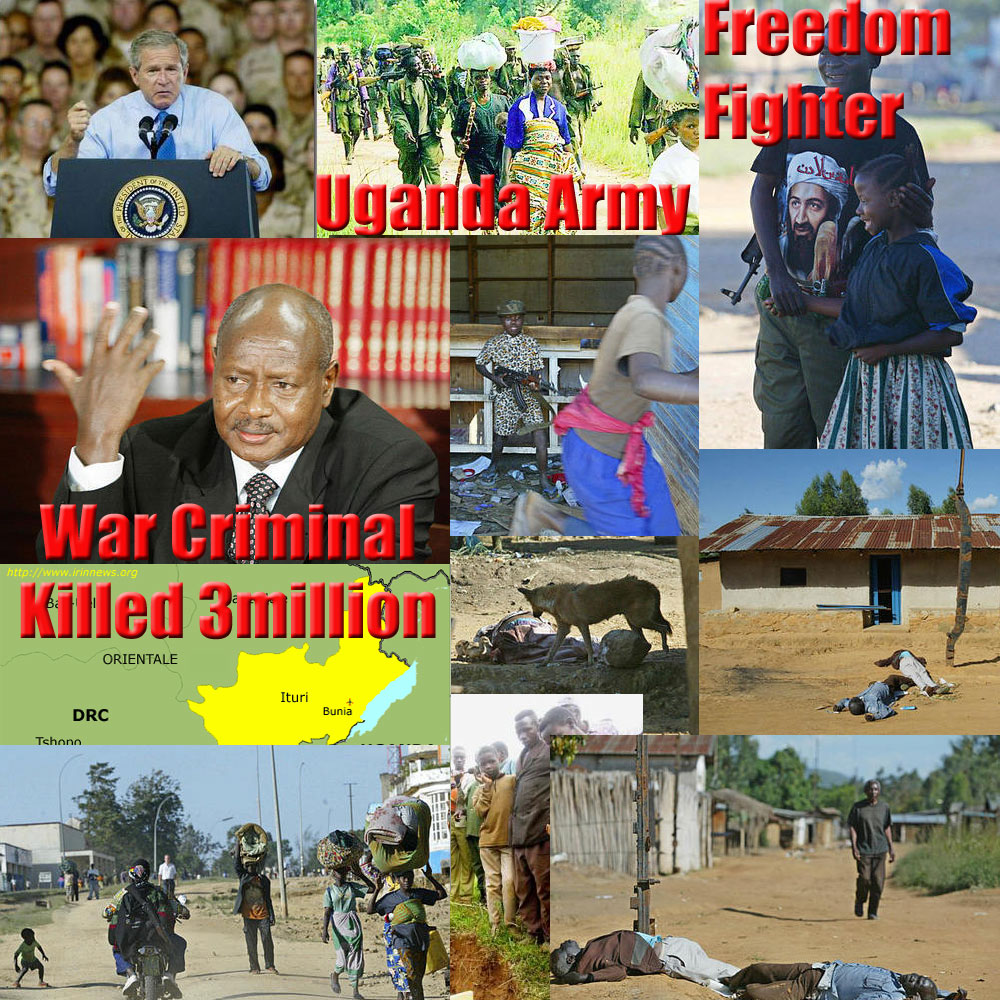
Some of his Key Lieutenants like Piere Bemba(the fat boy) and Thomas Lubanga are already in the international Criminal Court at the Hague. However, its the very so called international Community, mainly USA and United Kingdom that is sponsoring Yoweri Museveni's genocide against the African people. The Solution will be a people's regime change, that will hang him and then his smelly body fed to starving vultures, so that a bloody chapter in the African history is closed. Yes, that day is coming very soon and the world will be shocked how events can turn in Africa.
LONG LIVE AFRICA!!!
-
YOWERI MUSEVENI IS NOT A UGANDAN
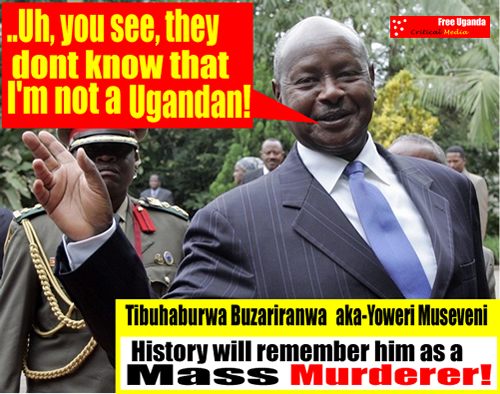
Who is this man who has mortgaged Uganda's future around himself, selfishly disregarding every institution, every person, and every thing as long as he remains in power? Does he love power all that much or does he fear crimminal charges that he faces if he leaves power? Who was the hand behind the murder of prominent Ugandans during Idi Amin's rule between 1971 and 1979, doing that in order to tarnish Amin's standing among the world?
He has sowed the seeds of anarchy in the Great Lakes region of central Africa where there was once stablity. Northern Uganda has remained a wasted land wasteland and kept deliberately behind on orders of Museveni. Hundreds of Acholi have had their lips and ears cut off by Museveni's special hit squads and cleverly blamed on the elusive leader of the LRA, Joseph Kony. Since the beginning of Nov. 2005, western tourists and aid workers have been killed in Northern Uganda on orders of Museveni in a move to play on western governments's feelings of insecurity and have the killings blamed on Kony. According to a recent top secret Central Intelligence Agency report, that it was Museveni who masterminded the 1994 genocide in Rwanda, the deliberate killing of thousands of Tutsis and Hutu civilians in order to blame it on the Hutu-dominated government. Who shot down the aircraft carrying Presidents Juvenal Habyarimana of Rwanda and Cyprien Ntaryamira of Burundi on 6 April 1994? Who engineered the assassinations of President Laurent Kabila of Congo, President Melchior Ndadaye of Burundi, and Major-General Fred Rwigyema, the first commander of the Rwandan Patriotic Army?
Sincerely why has the CIA only recently realised that it was Museveni who exterminated the Tutsi of Rwanda in that genocide or the hundreds of thousands of Congolese civilians between 1996 and 2002? Why did the world fail for a long time to connect the Rwanda massacres in which bodies were found without skulls and the thousands of skulls discovered in Luwero Triangle a decade earlier?International investigators say that the helicopter carrying John Garang of the SPLA/SPLM came down inside Uganda and not southern Sudan. Why is the Ugandan government refusing to cooperate with the investigators into the crash, if it was a crash? Who removed the altimeter of the helicopter from the cockpit before take-off on 30 July 2005 from Uganda to Sudan? With popular unrest against him growing every week and demonstrations breaking out among Makerere University students, the respected Bataka elders of Buganda, and supporters of Dr. Kiiza Besigye who was arrested on 14 Nov., 2005, Museveni is now desperate.What will a desperate Museveni do if he is not stopped by local pressure and if necessary military intervention from the international community? It is important for decision makers, diplomats, and the wider Ugandan public to know whom they are dealing with.
If we are not careful, Museveni's psychiatric condition will worsen as the political pressure leading to 2006 mounts, the man will start doing crazy things like burning Uganda's historic sites and buildings like how the Roman Emperor Nero, who was mad, ordered the burning of Rome! The sequence of Museveni's strange decisions and erratic public statements is convincing many Ugandans that Museveni could be clinically mad.
How can a normal man who is educated tell the authorities to cut down Mabira forest to clear land for "investors" when he knows how this will upset the environment and climate? A confidential report from British intelligence cabled to
London on 27Oct.,2005 outlined Museveni's deteriorating mental condition and said "He has a viracious appetite for all kinds of pleasures, and the instincts of a killer untroubled by remorse. He can be engagingly charming one moment, and
ruthlessly destructive the next. Someone affected by hypomania sleeps little and is ceaselessly physically active." Many people are still puzzled by what happened at the High Court buildings in Kampala on Wednesday 16 November 2005
when 30 armed men wearing black T-shirts and camouflage trousers entered the compound of the Court and beseiged it in front of a crowd of onlookers, diplomats, journalists, and supporters of Colonel Kizza Besigye. Many equated it with the
abduction of the late Chief Justice Benedicto Kiwanuka at the same High Court buildings in 1972 by unknown men. Who abducted Kiwanuka? Was it Idi Amin's soldiers? Read this document after which the High Court incident in November
2005 will make sense and add up.
We appeal to Museveni's staff and aides, ministers, army commanders and others around him to take maximum caution. Museveni might be unbalanced mentally but he is also very cunning. He knows that his aides and close ministers and
commanders are the same people who will be testifying against him once he is overthrown or is no longer in power. We appeal to these people in Museveni's inner circle to take maximum caution because at this rate he is going to start
bumping them off one by one to silence them. It is not Kiiza Besigye who is in danger from Museveni. It is Museveni's own inner circle. This is the most dangerous time in Uganda since 1966! This intelligence briefing issued as a national duty to help Ugandan voters, political parties and the international community make the appropriate decisions. Millions of people even many of the leaders in the DP, FDC, UPC do not yet really understand whom they are dealing with. It is a horrifying story of a cunning mind that ruled Uganda for 20 years
Material for this dossier on Museveni has been sourced from newspaper archives in the Library of Congress, the British Library, websites, a number of informants within the state security agencies in Uganda, academic publications and
books, and a number of contacts in Uganda, Sincerely we want to thank in particular the staff of the British Library who have been helpful in locating reference documents. 3.168] "Those who said of their brethren whilst they (themselves) held back: Had they obeyed us, they would not have been killed. Say: Then avert death from yourselves if you speak the truth." --- The Holy Qur'an
MUSEVENI'S ORIGINS
Museveni's origins are mysterious. Many versions of where he was born and his true nationality are claimed. Those who know him view the vague picture surrounding his origins as deliberately created. He one time said that he was born in Mbarara hospital and does not know his exact date of birth. That was in Mbarara in 1992, April. But later he changed and said it was Ntungamo! This ignorance of his exact birth date is not typical of a man who otherwise boasts of having an incredible memory and ability to recall events that many people have forgotten.You see, this unclear picture of Museveni's origin comes from the stigma that Rwandese and Ugandans of Rwandese origin have been subjected
to.Yoweri Kayibanda, a.k.a, Rutabasirwa was born around 1943 in Butare, Rwanda. Let him stop lying us that he was born in Uganda! The most informed sources who have known Museveni since his early child hood insist that he and his
mother, the late Esteri Kokundeka, came to Uganda from Butare town where he was born around April 1943. One of these sources Gertrude Byanyima the wife of Boniface Byanyima, the national chairman of the Democratic Party says
Museveni came to Uganda as a child from Rwanda. He spent part of his early teenage life in the Byanyima family home in Mbarara town in western Uganda. Byanyima used to pay Museveni's school fees or at least part of it. Let him deny it!
One time when she was speaking to party supporters at her home in Mbarara on 2 March, 1996, Mrs. Byanyima said:
"Museveni is just like us here. He came here at 16 and it's us who brought him up. He was never a good academic performer. The cupboard you see there was Museveni's library. When you check in it you'll find his books, a lot on
imperialism, with his former names Yoseri Tubuhaburwa."
When Byanyima claimed that Museveni "came here at 16", it was not so clear whether she meant that Museveni came to Uganda at the age of sixteen or that he first visited the Byanyima home at that age.
After she made that claim, some of Gertrude Byanyima's children Martha, Winnie, Abraham, and Anthony wrote a joint letter where by they apologised to Museveni for any embarassment caused to him by their mother's claim. But mark you,
they did not specifically refute or question the substance of what she said!
Gertrude Byanyima referred to Museveni as "Yoseri" rather than "Yoweri" and said those were his original names.
It should be noted that during his university days, Museveni used the initial "T" from a name Tibuhaburwa he had given himself. In full, it comes from the Runyankore expression "Obwengye Tibuhaburwa", meaning intelligence is natural
born, not learned. In a thesis which he wrote in 1971 titled Fanon's theory on violence: its verification in liberated Mozambique, the author gave his byline as "By Yoweri T. Museveni." Many people from western Uganda hold this same
view of Museveni's Rwandese roots and among them are the Banyarwanda of western Uganda or the Rwandese refugees who lived for forty years in Uganda before returning to Rwanda in 1990.
Most of these people give his origins as in Rwanda. Some of these people who know Museveni point out the fact that his mother never spoke any Ugandan language fluently in all her life, but only Kinyarwanda, the national language of Rwanda.
Many times Museveni has been challenged to prove his Ugandan roots by showing the public any graves and burial sites of any of his grandparents in Uganda but he has always avoided commenting on that. Those challenging him to do so bring up the issue because they know that there is nothing to show and want to put him in an embarassing position.
Therumours around Museveni's origins grew intense in 1992, leading him to appear in army combat uniform before a live national television audience where he listed a number of Runyankore names that he claimed were his. In Feb. 1994
while on a visit to Gulu, Museveni addressed a public rally. Some teenagers from St. Katherine Girls' Secondary School began to shout at him complaining that his NRM government was filled with Banyarwanda. "Look at him," they
remarked, "He is a Munyarwanda proper!" Museveni heard the comments and commented:
"These girls are saying I am a proper Munyarwanda. Maybe they bore me and they are in a better position to explain to us."
The embarassed headmistress of the school, Beatrice H.A Lagada suspended six of the girls. Museveni, though, did not confirm or refute the girls' claim.
In 1966, Museveni suddenly back slid from many of the fundamentalist Christian views he had once held. This, he says, after British missionaries in Uganda whom he knew advocated non-aggression in their response to the unilateral declaration of independence by Southern Rhodesia (Zimbabwe) in 1965. Museveni and some of his friends favoured an armed struggle to overthrow the Rhodesian government of Prime Minister Ian Smith. Something is not right here.
Museveni had been a fanatical believer in the message of the Bible. That all changed suddenly in 1966 and he then swung around to embrace a totally opposite out look to life which had armed struggle at its core. In his later years and
after assuming the Ugandan presidency, he would give his rejection of the gospel as coming from his disagreement with white missionaries over how to respond to the political crisis in Rhodesia. That would have been a good reason to
present, but this change in Museveni ran much deeper. Where he had once been sober and strict in his lifestyle, he started becoming sexually promiscuous, a development in his character that would have nothing to do with the
declaration of a white supremacist regime in Rhodesia.. We want to know the reason be for this drastic change.
Museveni's mother
During her years in Ankole in the mid 1960s, Museveni's mother had become a convert to the born again Christian faith.
She sometimes visited Bweranyangye Girls' Secondary School and took part in mission outreach programmes in Ankole.
Many people who observed her became convinced that her eldest son had taken his personality from her. She was eccentric and was fond of wearing woollen clothing. In some way Esteri Kokundeka was ahead of her time. The main
fashion of the day among the ordinary women in Ankole at the time was the traditional robes.
Kokundeka on the other hand took a liking for European fashions and so stood out as odd whenever she went about in public, wearing woollen clothes and western-style dresses, some of them above the knees in length.
At first some people wondered who this strange woman was, who was so different from the rest of her contemporaries in a society that was still very traditional.
She did not have an education and had not traveled widely out of her home area but looked to be very modern. Moreover she was a modest woman and a devout Christian. In between periods of depression and silence, she experienced high energy.
During her excited phases that was when the common village fellas started to feel that she might be mentally disturbed. What was beyond doubt at the time was
that Museveni's mother was suffering from some kind of mental disorder. She certainly showed all the signs of what they call bipolar disorder. (Madness, to call a spade a spade.) Bweranyangye Girls' Secondary School in Ankole, where her
daughter Violet was studying, is a place where Kokundeka used to visit a lot to preach. She was dreaded and shunned by many of the girls. They saw her as a tyrant, a complicated and extremely difficult woman to get along with. On some
occasions when she visited the school, girls would avoid meeting her and hide in the dormitories. She did not display the normal affection and motherly traits that would be expected in a parent, even toward her own children. She was not
affectionate and was too unreasonable and hard to understand. Many became convinced at Bweranyangye that Kokundeka had a mental problem.
In 1967, she did have a mental breakdown. The details of that are not so clear. But she was admitted at the Butabika Mental Hospital on the outskirts of Kampala that year. Her mental disorder combined with the series of traumatic
experiences in Rwanda that affected her so drastically as to lead her to reject her son, are the rock on which the crisis in Museveni's life originated. That crisis in Museveni's life lies at the root of the personality that we shall examine in
forthcoming pages.
People who knew him during the mid 1960s say the change was brought about by rejection from his mother, Esteri Kokundeka. It was not Rhodesia, for God's sake!
How she rejected him, why she rejected him, and when she rejected him is something we don't know. I will not lie that I know. But it seems to have been very painful to him to rock the foundation of his whole entire life. Maybe he had tried to
probe her to tell him who his real father was and she dismissed his questions.
Maybe he persisted with his questions and in impatience, his mother finally disclosed to him the circumstances of his birth.
What brought her from Rwanda to Uganda reportedly either still pregnant with Museveni or when he was still an infant? Those who knew Museveni's mother all through her life in Uganda remarked at how bitterly she hated and
resented Rwanda.
In 1982 during Museveni's guerrilla war, one of Museveni's most trusted commanders, Kahinda Otafiire, was charged with smuggling her out of Uganda through Rwanda and then on to Nairobi, Kenya where she would
see her son. Museveni's mother protested vehemently saying she hated Rwanda and did not want to go there ever again in her life.
After repeated begging, Otafiire managed to get her into Rwanda from where the two went on to Kenya.
This gives us an interesting look into Museveni's origins.
Sincerely why should his mother resent and hate Rwanda so much unless she had once lived there or had heard too much about it or maybe had experienced enough about Rwanda that even to talk about Rwanda made her feel so bad?
It is one thing to hate Rwanda.
It is quite another for your son's commander and aide Otafiire to want to take you safely out of Uganda to Kenya at a time of high risk and yet you would rather remain in harm's way in Uganda than set foot in
Rwanda. What was it about Rwanda that Museveni's mother hated so much?
We can guess the following things.
She knew Rwanda much better than the average illiterate village woman. She definitely hated the country. She seems to have either lived there for some time or even originated from Rwanda. She seems to have had such a terrible experience
in Rwanda that her outlook toward that country was clouded by all sorts of resentment.
What terrible memory was this?
Was she raped as a girl or young woman or sexually molested by someone in Rwanda?
Or even more traumatic, had she become pregnant while in Rwanda by a relative, so that she had to live with the stigma of having an incest sexual
relationship hanging over her and bringing her distress?
Did she become pregnant by a brother, a father, and uncle and
unable to stand the shame of the affair, decided to flee Rwanda for Uganda, bringing with her the illegitimate son?
Maybe this could explain her hatred of anything to do with Rwanda. If this is true, we have the correct understanding why she rejected the young Museveni.
An ordinary terrible event in Rwanda like clan or tribal fighting or a dispute between two families would have made her resent the Rwanda society at large but bring her closer to her son.
But she resented both Rwanda and rejected her son. Our conclusion is that she might have concieved her son with a close relative, or a servant in the homstead in Rwanda and there is a chance that this might even have been a forced
sexual encounter.
She would then see her son and in him a reminder of the shaming incident in Rwanda that led her to abandon her home and flee the country for Uganda. So it seems that she must have directly or indirectly told Museveni
of the circumstances of his birth and parentage and once he knew this, a deeply traumatising personal crisis shook him.
Sincerely it is not easy dealing with such a shaming news, more so from your own mother.
Museveni's biological father was an itinerant Rwandan peasant called Kayibanda. Current sources indicate that Kayibanda lives in Tanzania while
others say he lives in Butare town in Rwanda. Other reports have it that Kayibanda died in Tanzania in the 1990s.
We are not sure and where we are not sure, we shall not pretend to know.
According to some reports, Kayibanda and his wife Esteri Kokundeka came to Uganda when Museveni was a toddler.
There is a story common in Ankole but difficult to prove for its accuracy, about how Museveni's parents ended up in Uganda. This version has it that Museveni's mother was of royal Kinyarwanda Tutsi stock. Apparently during one of her
many idle moments at the royal court in Rwanda, she was seduced by or seduced one of the court workers, a Mutwa named Kayibanda.
Museveni was the result of this laison, making him paternally a Twa and maternally a Tutsi.
Her proud Tutsi royal family had to quickly chase her for a shaming them. So she fled to Uganda for ever. Because of the disgrace she had brought upon herself by this liason with a despised commoner, she, the commoner, and their son
Museveni were banished and fled across the border into Uganda. Being desperate to find means of supporting the woman and their child, Kayibanda the journeyman was given employment as a herdsman by a young cattle owner
named Amos Kaguta.
Kaguta was also of Rwandese stock and his brothers are reported to have remained in Rwanda when he migrated to Uganda. It was not long before Kayibanda eyed on Kaguta's wife. Kaguta angrily banished Kayibanda from his home and Kayibanda fled to Tanzania with Kaguta's adulterous wife.
But Kaguta retained Kokundeka and her child Museveni as his wife and child. Kayibanda and Kokundeka had a second born child, a girl who later got married to a Rwandese Ugandan named Nathan Ruyondo. Ruyondo would became a Ugandan civil servant in the town of Masaka. Museveni, therefore, had one direct sibling, this girl who got married to Ruyondo.
The day before he started his guerrilla war in 1981, Museveni travelled to Masaka and spent the night in his true sister's home, on 5 Feb., 1981. He used Ruyondo's Peugeot 304 to drive to the Kabamba army barracks for the attack the next day, 6 Feb., 1981. When he narrates his attack on Kabamba in Sowing The Mustard Seed, Museveni describes Ruyondo as "one of my
acquainatnces." Acquaintance indeed!
How with a sensitive life-and-death attack coming could he borrow the car of an ordinary "acquaintance" without being worried that this acquaintance could betray him to the authorities, if the car's ownership was traced back to Ruyondo?
These are all his lies. This Peugeot 304 belonged to Museveni's brother-in-law, something he never admitted because in Masaka town, it was commonly known that Ruyondo's wife was pure Rwandese. And so for Museveni to even hint at a
close relationship with Ruyondo or to admit that Ruyondo's wife was his direct paternal and maternal sister, would have confirmed to many that Museveni is really Rwandese.
Kaguta, having retained Esteri and Museveni later had a child in 1949 with Esteri. She was named Violet Kajubiri because she was born in the "year of the jubilee", the fiftieth anniversary of the founding of the Protestant church in
Uganda. Meanwhile, in the late 1950s there was heavy activity of Arab hides and skins traders, especially in the cattle corridor of western Uganda.
These Arab traders had traveled back and forth along the route between the East African coast of Kenya and Tanzania and the western interior of Uganda for several generations. Their ware was hauled over this long distance by among others Yemeni drivers who came from families that had settled in Mombasa along Kenya's
Indian Ocean coast. In his 1997 book Sowing The Mustard Seed, Museveni confirms this trade link between the East African coast and Ankole when he explains his early years:
"In the days of my early childhood...cattle were literally central to our whole lives....For clothing I wore the skin of a premature calf...although at the time it was no longer the common way of dressing. Even before the Europeans came,
people were wearing textiles brought by long-distance travellers from the Swahili coast." (page 4)
One of these Mombasa Yemeni lorry drivers met Museveni's mother who was known to be a little loose and a child was born to them in 1960 named Salim Saleh. That is why Saleh who is also known as Caleb Akandwanaho has never used the name Kaguta as his middle name even after he became a senior government official.
That by itself is more proof to the idea that Kaguta is not Saleh's father. When Museveni came to power in 1986, rumours that he was Rwandese filed
Kampala. You think Salim Saleh would not have used Kaguta's name in order to be respected if Kaguta was really his father?
In a Boston Globe article published on 1 May, 2005, a former U.S ambassador to Uganda Johnnie Carson referred to Caleb Akandwanaho (Salim Saleh) as Museveni's "half-brother" This fact which was widely known in Uganda is
one of the signs that Museveni's blood father was different from Saleh's. The name of Salim Saleh's biological father is not known. Maybe he can tell us himself.
During the 1979s exile, the Museveni family lived in the Upanga Estate next to Sebender Bridge in the Shimo la Udongo area of Dar es Salaam, Tanzania.
They teenager Saleh was very close to the Arab and Somali community although the rest of the Museveni family was polite but distant from their Arab and Somali neighbours.
These Somali and Arabs regarded Salim Saleh as one of their
own. Many people assumed that he was a Somali or coastal Tanzanian.
Saleh in his younger years was slim and light-skinned in complexion and you ould easily see the phycical features of one with Arab and possibly Somali blood. You look at Saleh's flat hips and curly hair properly next time when you see him.
You will see! It was only in the 1990s as he grew too bulky and his HIV condition began to darken his skin, that he started to blend in more with the general Ugandan population.
Museveni became close to Colonel Gadhaffi of Libya because he used Saleh's Arab blood to convince Gadafi that he was really pro-Arab causes. We shall see later why Gadhafi also became close to the Toro kingdom through another of Museveni's manipulations.
Meanwhile when Museveni came to power in 1986, his biological father Kayibanda came to Uganda from Tanzania to visit his son and share in the new-found recognition and fame as President. Museveni gave his father a blasting that he never forgot!
He gave him money and angrily told him never to come back again. Museveni's mother came to Uganda pregnant with the boy<strong> Rutabasirwa.</strong>
That is Museveni's real name. Forget the Museveni nickname. His middle name was adopted from his stepfather Kaguta and he only began to use the middle name Kaguta after he became president.
According to Museveni's inner family members, Kaguta's brothers live in Rwanda.
This proves that even Museveni's half-sister Kajubiri is Rwandese and not Ugandan as we assumed all along. It was strange for many years that Amos Kaguta did not seem to have immediate relatives in Uganda and yet there were never any reports of any of them having died and been buried in Uganda.
In addition, during the 1930s and 1940s and even right up to the 1950s, there was tremendous prejudice among the Banyankole tribe of the Ankole kingdom Uganda
against Rwandese, particularly the Tutsi. The prejudice ran much deeper among the peasants.
You think with Esteri Kokundeka being a Rwandan Tutsi, it would have been possible at the time for her to get married to a Munyankole man, more so if she already had a child from another man? Not possible! Only when you know that Kaguta is a Rwandese Tutsi then you see why Kokundeka got married to him.
One of Museveni's closest childhood friends was Eriya Kategaya whose mother was Rwandan Tutsi and father a Munyankole. The bias that the Banyankole felt toward the Banyarwanda at the time would have made it difficult for Museveni and Kategaya to be so close, unless at least one of Museveni's parents was Rwandese.
In the 1990s, Museveni made a habit of publicly promoting the Runyankore language, praising the Ankole cultural heritage and saying he was compiling a Runyankore-English dictionary. (By the way, where is the dictionary? We have
never seen it.) Those who know him and watched him commented that this was a bid to make himself look a true Ugandan and deflect any remaining rumors that he might be Rwandese.
The very first sentence on the very first page of Sowing the Mustard Seed is revealing. Museveni writes: <strong>"I was born among the Banyankore Bahima nomads of south- western Uganda in about the year 1944."</strong>
In this first line, Museveni would once and for all have dispeled the rumours
about his origins by stating categorically<strong> "I am a Munyankore Muhima."</strong> He was careful not be specific about that.
Instead he vaguely says he was born among the Bahima.
Museveni's school days and first job
Museveni attended Kyamate primary school, Mbarara High School, and Ntare School, all of then Anglican Protestant schools. During his time in secondary school, his schoolmates found him strange and many thought he might be mentally unstable. His radical views and eccentric behaviour while at Ntare School made him stand out. He was an ardent member of the school's debating club and Scripture Union, the study group of the Anglican church in Uganda. Members
of the Scripture Union found him to be domineering and even in a religious setting, he was always trying to force his views on the association.
Instead of a conciliatory Christian stance when others expressed views contrary to his, Museveni during unguarded moments displayed a militant attitude. Museveni's behaviour at Ntare School in Mbarara was similar to that of his mother's. Even when his friends and classmates made an allowance for his behaviour being part of the normal turbulent teenage years, some of it was not. One time in 1965, Museveni called a strike which became so violent that a prefect in the school was beaten to death. Museveni was arrested and taken to the Mbarara Police Station.
He was taken to the Mbarara district commissioner at the time, Edward Athiyo. When Athiyo saw this young boy who was so thin and had no buttocks almost, he could not believe that Museveni could cause such chaos.
So Athiyo ordered Museveni to be given 12 strokes of the cane and released. That is how people went on underestimating Museveni for many years. They always think he is weaker than he looks, politically and physically. It was troubling
because Museveni did not do things on the spur of the moment. He thought things out appeared to know what he was doing. But what he did was not the acts of a normal person.
One of the persistent statements that Museveni had started making was that he was determined to be the president of Uganda one day in the future. He was laughed off as a clown by his schoolmates who saw this as one more of his
characteristic outbursts.
He kept mentioning this time and time again. He was ignored and dismissed by onlookers as out of his mind, as usual. Something that has never been analysed is his obsession with being Uganda's head of state that
began to rule Museveni from his late teens. The young man was too ditermined to be president that one has to ask sincerely why be so consumed with being leader of a ramshackled African country without any other career ambition?
He never explained what he planned to do when he achieved this dream. There is not definite evidence in this regard, but it can be assumed that Museveni went through a terrible experience as a teenager either being mocked for not
having no ethnic and family roots or watching with deep envy his friends and other schoolmates with families and a sense of social belonging and he with none. What was also known by people at the time is that <strong>Museveni's mother was widely rumored to be a part-time prostitute.</strong>
That is part of the reason she came to have four children from three different men.
Museveni was teased and mocked over the fact that his half-brother Saleh was an Arab and these insults cut deeper into Museveni.
The rumour that she was or had been a prostitute persisted everywhere she went, to the point that it seemed to have at least a grain of truth to it. A humiliated Museveni must have developed a great need to compensate for his too
shameful background.
There could only have been one way to do this and that would be to become the powerful head of state, thus rising even above the traditional kings of Ankole, Toro, and Bunyoro of western Uganda whose subjects he lived and studied among.
To be president required simple Ugandan citizenship which he could claim to have.
One did not beyond that need to be from a particular ethnic group because the presidency was not hereditary. He had to dominate and domineer those who had insulted and mocked him. After sitting his advanced level exams in 1966, he passed to go to Makerere University in Kampala in 1967 to read Law. In his A'Level exams, he scored three principals: DDD in History, Economics, and Literature. What he got in the compulsory supplementary subject, General Paper we do notknow.
One day a journalist should ask him at a press conference to tell us how much he got in General Paper. But even if Museveni got only DDD in his principal subjects, he knew many things because he used to read widely. So there is a big
chance that he scored highly in General Paper. Someone can even assume that he got a Credit 3 or maybe Distinction 2.
But you can see why he feared to tell us how much he got in A-Level when he wrote the Mustard Seed because if Ugandans knew he got DDD they would wonder about the only man with a vision to rule Uganda! DDD even in the 1960s
was not a result to make you celebrate with delicious chicken. Makerere at that time was one of Africa's most prestigious institutions of higher learning.
But Museveni was unable to complete his first year there. Museveni has claimed the reason he did not attend Makerere University, saying that he originally put his first choice as Dar es Salaam and Makerere only as a second choice.
According to a source then working in the Office of the President at that time,
Museveni got a mental breakdown at Makerere. In a panic, Uganda's Prime Minister Milton Obote quickly had a letter written and arranged for Museveni to be flown to Sofia, Bulgaria in eastern Europe where he was admitted in a psychiatry
hospital. Because of this, he was unable to continue at Makerere. Explain why did Obote get involved in the personal matters of an obscure student from western Uganda? The reason is that <strong>Museveni had been a youth winger and member of the ruling Uganda People's Congress party.</strong> Obote was well known for his loyalty to even the young people affiliated with his party. President Obote rang up his Tanzanian counterpart President Julius Nyerere and said he wanted Nyerere to recommend "this illustrious young man" Museveni to the University of Dar es Salaam.
A letter was later written to President Nyerere formally requesting him to help gain admission for Museveni at Dar es Salaam. It is not clear what triggered off Museveni's mental breakdown. Maybe it had something to do with his mother's breakdown that same year and therefore was part of a cycle of mental breakdown by mother and son or was an incident isolated.
It is not known.
Much later in life as President, Museveni was hostile to Makerere University in a funny way. Some now trace that hostile feeling back to the haunting memories it gives him of his mental illness in 1967.
At Dar es Salaam University between 1967 and 1970 he studied law for his first year but owing to his insignificant performance, he was transferred to the Political Science department for the remaining two years at the university. On the
first day of the law class, the lecturer asked each of the students to stand up and introduce themselves.
They did so in turns. Museveni was seated right at the back of the class. When it came to his turn, he stood up and said, "I am Yoweri Museveni of Rwanda." Some Ugandan students in the class were surprised, as most of them had always assumed that he was a Ugandan from Ankole. Knowing his stubborn ways, they dismissed this statement as one of his pranks and attempt at humour. He soon became involved in radical nationalist and leftist politics. During his second year at Dar es Salaam University in Sept. 1968, Museveni visited the military camps of the Mozambican independence group, Frente de Liberatacao de Mocambique (FRELIMO), and acquainted himself with their goals. There are some people who doubt his claim to have seen combat action in Mozambique, but anyway let us give him the benefit of the doubt.
At Dar es Salaam University, Museveni was one of the leaders of a radical student association, the University African Students' Front (UASF), a discussion group that advocated pan-African unity and advanced the struggle for Africa's independence. The university published a Marxist magazine called Che Che, whose main theme was revolutionary causes and African liberation. In one of its issues, Museveni wrote an article in which he compared President Nyerere to the 19th century German leader Otto von Bismarck.
An aide to Nyerere read and was impressed by the article and sought out this
Museveni who had understood Nyerere in such visionary terms. A mentor-protégé friendship between Nyerere and Museveni soon grew.
In 1969, Museveni visited Makerere University from Dar es Salaam University where he was a student. He went to speak at a seminar on African liberation.
He had recently returned from Mozambique where he watched the FRELIMO guerrillas train and was impressed by their level of organization and in particular, their interpretation of the role of a soldier in Africa's independence struggles. In a
speech to the students at Makerere, Museveni passionately argued that war the highest form of political struggle could only be conducted by political fighters not by politically neutral soldiers.
This speech at Makerere spelt out Museveni's beliefs and because he emphasised them so forcefully, we can surmise that he had now come to the conviction that war was to be, henceforth, his principal vehicle for the pursuit of his ambitions and the application of his political ideas.
One day late in 1970 while at Dar es Salaam University, Museveni suffered another mental breakdown. Like the breakdown in 1967, it was not a breakdown caused by fatigue, stress, or any result of a work overload. It was a breakdown that was definitely triggered off by mental illness.
This time he was flown to a psychiatric hospital in Oman in the Middle East. After
undergoing treatment, Museveni returned to Dar es Salaam. After completing university in Tanzania in March 1970, Museveni applied for and got a job in the Ministry of Foreign Affairs. President Obote met Museveni again in Aug. 1970
and was impressed enough by the young man that he had him transferred to the Office of the President at the parliamentary buildings in Kampala.
There, Museveni joined a branch of the Ugandan intelligence service, the General
Service Unit. Prior to its founding in April 1964, the General Service Unit was an off shoot of the Protocol Department in the Office of the President.
This branch was called the State Research Bureau and was headed at that time by Picho Ali.
His brother, Albert Picho Owiny, was also a youth activist with the ruling UPC party. Museveni also worked with the head of the research department in the President's Office, Wilson Okwenje (who later became the minister of public service and cabinet affairs in Obote II regime in 1980.)
Museveni's official title was Assistant Secretary for Research.
Among the other young men in the research department of the President's Office were Jaberi Bidandi Ssali, Zubairi Bakari, Kintu Musoke, Yuda Katundu, Michael Micombero-Mpambara, Kasendwa-Ddumba, Erifazi Laki, Edward Rugumayo, Moses Musonge, John Ateker Ejalu, Abbasi Kibazo and many others. The overall director of the country's intelligence services was Obote's own cousin, Naphtali Akena Adoko.
Museveni's colleagues in the General Service Unit found him to be too impatient and quarrelsome in dealing with people. He was always secretive in the office and
appeared to find it difficult to trust people. He never opened up to his colleagues and they felt sure he was holding back much of himself from them. It was Picho Ali who knew best how to deal with Museveni.
Ali was an extremely intelligent young man with good command of English. He would dismiss Museveni's petty bickering with one single word which would leave Museveni boiling like a volcano and the rest of the office cheering. Like it or not,
Museveni was not popular. Explaning in the Daily Monitor newspaper of Kampala on 16 Oct., 2005, Wilson Okwenje
said:
"It was in my capacity as head of research in the President's Office that I met Yoweri Museveni for the first time in 1970.
He had come to us after graduating from Dar es Salaam University. We worked together up till the military coup of 25 Jan., 1971.
At that time, as an assistant secretary, he was just another face in the crowd, as a matter of speech, although I came to know that he harboured political ambitions and I suspected that he was using his work at the President's Office as a
stepping stone."
The question is, how was Museveni "using his work" as a stepping stone to his real ambitions? It goes without saying that someone in that position would have enjoyed a certain amount of access to secret government files and information.
He had security clearance and made sure that his position benefitted him in a far-reaching way than just gaining an office desk for administrative experience.
In 1970 unknown to most people, Museveni had began to collect weapons for
reasons known to himself. How he got the arms in the first place without being questioned or arrested, is equally unknown but he used his security clearance to get them in without causing sucpision. Museveni kept the rifles and pistols
hidden in a location in Salaama near Kibuye along the road to Entebbe. He also tried to recruit some of his friends into what was a future armed struggle. Many of them did not take him seriously that a junior intelligence officer actually meant
what he said when he claimed to privately own guns and was planning an armed struggle.
Murder of Brigadier Pierino Okoya
On 25 Jan., 1970, the commander of the army's Second Infantry brigade, Brigadier Pierino Yere Okoyo and his wife Anna Akello Okoya were shot dead outside their home at Layibi, just outside Gulu town by unknown assailants. Brigadier
Okoya was buried together with a sheep.
Okoya had been one of the most vocal in criticising the army commander Idi Amin for fleeing the scene of an 19 Oct., 1969 assassination attempt on President Obote at Lugogo in Kampala.
As soon as news of the attempt on Obote's life became known, Brigadier Okoya drove from Jinja, 80 km from Kampala and gave orders for the army to remain in the barracks and restrain themselves. Okoya accused Amin of being a coward and
wanted disciplinary action taken against the army commander. He went on to suggest that Amin might have had something to do with the assassination plot. At the time Okoya was shot dead, Amin had been flown to his hometown of
Arua toward the border with Sudan by an Acholi pilot. Obote ordered an inquiry into Okoya's murder.
The first suspects in the Okoya murder were four men Captain Frederick ("Smutts") Guweddeko, an airforce officer; Patrick Mukwaya, a businessman; Siperito Kapalaga, also a businessman; Fred Kyamufumba, a flight technician; and two other men, Kalule L. Lutalo and Sebastiano Lukanga.
These men were allegedly paid of murder Okoya.
Two young women Milly Nantege and Mary Kajjansi who were girlfriends of two of the accused, were also arrested and tortured to obtain confessions since it was assumed that they would know something about the plot.
President Amin appeared before the panel investigating the murder of Okoya on 15 May, 1971, less than four months since coming to power. Speaking before Justice Richard Dickson, Amin said he did not ask Captain Guweddeko to
recruit civilians to assassinate Okoya. On 16 June, 1971, an 86-page report by Dickson was published in which it was stated that the killers of Okoya remained unknown to that day. According to Guweddeko speaking in 1972, he had been
arrested at a barber's shop in Wandegeya, a trading centre just outside the city. He said a police C.I.D officer tortured him continually in order to force Guweddeko to admit that 'it was General Amin who gave them the money to hire people
to kill Brigadier Okoya,' The People newspaper said. Investigations following the crime revealed that the kind of bullets that had been used to kill the Okoya couple were to be found in only two sections of the security forces, the army
barracks in Mbarara and the General Service Unit intelligence agency.
This brings two scenarios. The first thinks that the person who ordered Okoya's murder was either connected in some way with both the army in Mbarara and the General Service Unit or one of them.
The other scenario thinks that the master planner behind the murders used people in the army based in Mbarara or agents in the General Service Unit. It is
the combination of Mbarara and the General Service Unit that makes the picture more interesting.
To add pepper to salt, The People newspaper, owned by the UPC party, quoted a government statement issued on 13 April, 1972 in which the government explained reports of missing people allegedly murdered by the military regime:
"Most of the people reported missing, the statement says, are from Ankole and Kigezi districts, which districts were areas of concentration for recruitment to the defunct General Service Unit." (The People, 14 April, 1972). This is the
UPC paper speaking, mind you. We get from it we get credible and independent proof that the General Service Unit intelligence agency was not dominated by officers and agents from Obote's northern Nilotic Acholi and Langi tribes as
most people think but by agents mainly "from Ankole and Kigezi districts."
We had some well known characters in GSU from the west in the shape of Michael Micombero-Mpambara from Kigezi and the Yoweri Museveni from Ankole. Let us focus on Museveni the thin man without buttoks who caused the Ntare strike in 1965. Okoya was murdered in Jan. 1970, at a time that Museveni would have still been a student in Tanzania. So how could he feature in the killing of Okoya unless we are telling nice fiary tales?
You see you must always know how a triky man thinks. Museveni was not like you and me. It seems he grew old before his time especially in matters to do with state security and the workings of the government system. While most of his
classmates were leading ordinary lives and harbouring ordinary career ambitions, Museveni was different. Too different!
By 1966 he was already aflame with the passion of African revolution. He followed news events in Uganda keenly and behaved much older than his age. On 30 July, 2005, in Mbarara, Museveni told a bridal giveaway party ("Okuhingira")
that he had first planned to wage war against the Obote government in 1967.
"I was to start the war against dictatorship when I was still a student at Ntare School in 1967 when Obote abrogated the constitution, but mzee Kahigiriza advised me not to because it would cause more problems," Museveni said. The date he referred to there was actually Feb. 1966 not 1967 if your have seen his explanation in Sowing The Mustard Seed. By this age, Museveni had developed an
understanding and appetite for armed struggle and political violence. It is common knowledge that Museveni as a student at Dar es Salaam not regular in the time he spent at campus. We said before that he had visited the guerrilla-held areas
of Mozambique in 1969 where his encounter with the FRELIMO guerrillas made a deep mark on him.
Even more important but which Museveni does not refer to it publicly, he had joined the intelligence service earlier than he openly admits. This had happened while he was still a student at Ntare School. In the chaos atmosphere following the
attempt on Obote's life in 1969 the young Museveni who is so cunning calculated that killing Okoya would inevitably bring the blame on Amin. In a book published in 1976 to explain the Israeli side to the 1976 hostage crisis at Entebbe, the
deputy editor of the Israeli airforce magazine, Y. Ofer, revealed details that appear to spare Amin of Okoya's murder.
The book titled Operation Thunder: The Entebbe Raid: The Israeli's Own Story, mentioned this detail on page 60. Read it yourself and see:
"One day when a Ugandan brigadier-general named Okea , a member of the Acholi tribe, had been murdered, President Obote planned to exploit the assassination to oust Amin, and he started the rumour that the Chief of Staff had been involved in it. Idi Amin was then in Cairo...[The Uganda minister of defence, Felix Onama...investigated the matter and learned that Obote was planning to detain Amin on his return to Uganda on the trumped-up charge of having
assassinated the brigadier-general."
We should bear in mind that Museveni had secretly been acquiring arms in 1970 and hiding them at Salaama. We canot rule out the chance that he might have at least hired out guns in Jan. 1970 for the assassination of Okoya.
A big evidence linking Museveni's possible role in Okoya's murder came in Aug. 1985 shortly after Obote was overthrown for the second time.The elderly father of the late Okoya told a tribal meeting in Gulu that his son had not been murdered by
Amin.
Even more surprising speaking also in Gulu nine years later in 1994, the former Ugandan head of state General Tito Lutwa Okello told a public gathering that Amin did not murder Okoya. Tito Okello had escorted President Museveni on 1
Feb., 1994 for the opening of the Koch Goma health centre in Gulu. Okello was a Lieutenant-Colonel in the 1960s army under Obote and knew enough about the army and Uganda's politics to know what he was talking about. Speaking in
Luo language in Gulu that day to his own tribesmen the Acholi, Okello added something intriguing.
He said: "There are some people who up to now know who killed Okoya but they are quiet. Okoya was killed in the same way that Colonel Omoya was killed... right now you have started to gang up again under the system and the people who killed your sons." Who was Okello referring to when he said the people who murdered Okello were in Uganda at the time he spoke, in 1994?
This was a political murder. Okello did not mention people by name. He could only have remained silent about their identity if they were influential within the Acholi community and he did not want them to be shunned by their tribesmen, or the killers were in the government at the time and he did not want to invite
their wrath. It was one of the most puzzling statements made by a political leader during the 1990s.
Okello criticised the Acholi for ganging up "under the system and the people who killed your sons." Was he referring to the Acholi rebel
leaders like Alice Lakwena and Joseph Kony? If that is the case their rag-tag armies and rebel groups were a joke and you could not say they were a "system."
By early 1994, both of these Acholi rebel leaders had come to be regarded as too weak to seriously threaten the Museveni government and so it was pointless for Tito Okello to bother about cautioning the Acholi over these rebel leaders.
Okello said also that the Acholi had "started" to gang up under the system that had brought suffering to them and killed their sons. By stating that he could only have been referring to the National Resistance Movement government under President Yoweri Museveni. An Acholi-led military coup and government headed by Okello himself had ruled Uganda six months before Museveni came to power and the Acholi supported that. For 30 years, the Acholi had given their support to the UPC and DP governments of Milton Obote and Benedicto Kiwanuka. So they could not have "started" giving their support to a system and got Tito Okello's criticism, unless he saw them as supporting a new system that they had historically not supported or known. Tito Okello's intriguing statement in Gulu in Feb. 1994, clearing of Amin's role in Okoya's murder by the Israeli airforce magazine boss in 1976 tells us that it was not Amin.Because the bullets which shot Okoya and his wife came from the GSU or from Mbarara barracks makes one to believe that it was Yoweri Museveni who killed both Brigadier Okoya and Colonel Omoya in 1970. You see when the Acholi hate Museveni for 20 years we can wonder if there can be smoke without fire! Acholi have shunned Museveni with more rebel groups than all other tribes and this can make one to wonder if maybe they possibly know that Museveni killed their Acholi military sons.
On 7 Oct., 1970, President Obote, President Jomo Kenyatta of Kenya, and President Julius Nyerere of Tanzania went to Makerere College in Kampala to attend a ceremony in which it was to be officially made a university; the University of East Africa. The heads of state were applauded. But when Amin was introduced, he received a standing ovation and cheers from the students assembled for the occasion.On 11 Jan., 1971, President Obote summoned Amin to his office and told him that the army had overshot its budget by 2,691,343 Pound Sterling. He also told Amin about the report into the killing of Okoya. Five days later on 16 Jan., 1971,
Amin called a news conference and said that Obote planned to have him arrested using intelligence agents. Sincerely why should Amin do this, addressing a press conference charging that the commander-in-chief was planning to have him
arrested, an action in breach of army discipline? Amin was definitely aware that the climate in Uganda had turned too political than usual. By addressing a press conference, he tried to appeal for support directly from the public where, he
must have known he enjoyed sympathy to make such a direct charge against the President worth the risk.
FRONASA takes on Amin (1971 - 1979)
On 25 Jan., 1971, Major-General Idi Amin came to power in a coup staged by officers and men of the Army. Most of the coup makers were Muslims from the West Nile or of Sudanese Nubian origin.
On the same day as the coup, Museveni and a group of friends opposed to Amin fled to Tanzania. Those ones were Zubairi Bakari, Abbasi Kibazo, Erifazi Laki and Yuda Katundu. These were GSU spies like Museveni. They later decided
to launch an armed insurrection against the new military regime. The Amin coup was one of the most popular events since Uganda won independence from Britain in Oct. 1962. You could think as if Uganda had won the World Cup.
Mamoth crowds greeted Amin everywhere he went in Kampala, as he drove himself in an open jeep accompanied by troops. The coup was most welcomed and popular in Buganda. Some people have wondered why Museveni and his
fellas speeded to exile the next day after the coup. How did Museveni instantly see that Amin was a dictator when the champagne was still flowing and people were drinking like fish and dancing like night dancers on the streets? Unless he
tells us that he has a sixth sense like a magician. Museveni has always tried to appear a hero by claiming that he was one of the few who decided that they could not serve under Amin's dictatorship.
In Sowing The Mustard Seed, Museveni says on the afternoon of the coup he sat down with his friends and calmly saw the legacy of Idi Amin (before it was even
a day old!) and they concluded that they could not work under the Amin "system", a system that was yet to even get full control of Kampala, let alone the rest of the country. One cannot judge the character of a regime on its first day unless you are God and Museveni is not God. The answer to the puzzle is that Museveni had been part of a small team of intelligence officers pressing Obote to arrest army commander Idi Amin. Museveni's colleagues Laki, Kibazo, Bakari, and Katundu were intelligence officers like him. The army's former quartermaster boss a Langi army officer by the names Lieutenant-Colonel David Oyite Ojok, had also been one of those urging Obote to arrest or at least put Amin under control. Tensions were building in the army and some in the UPC government felt Amin was becoming a threat to Obote.
Obote, as usual, had been indecisive over this issue. But at the urging of Museveni and others, Obote ordered the arrest of Amin while the president was attending a Commonwealth summit in Singapore. Museveni, like Oyite Ojok, fled Uganda shortly after the coup because he knew Amin would have arrested him had he stayed around Uganda and keep him in jail like a rat.
Museveni also knew he had a case to answer over the murder of Okoya because he had been trying to pin the blame on Amin and now Amin was in power.
If Museveni killed Okoya and it was Okoya who had accused Amin of deserting Obote on the day of Obote's escape from an assassination, then with Amin now in power there would have been nothing for Museveni to fear. If anything, Amin might have offered Museveni a prominent position in the new government and Museveni, with his well-known love for power would only too willingly have taken up such a position. Museveni who killed Amin's chief critic Okoya could only
have won himself Amin's support. But you see a guilty man runs before they raise the alarm so Museveni fled immediately into exile. Let him explain the Okoya murder and you will see how his heart beats with fear and guilt.
Amin's huge popularity
As we saw even before he took state power, Amin was too popular even from the reception he got at Makerere University on 7 Oct., 1970 when he accompanied the three East African presidents to the inaguration of the university.
Amin's taking of power on 25 Jan., 1971 had been greatly welcomed in the most heavily populated and most politically and economically populated part of Uganda, Buganda. Many hundreds of thousands of Baganda welcomed Amin's coup to the extent that he could even be made a prince if he had wanted to.
Removing the man who the Baganda never forgave for humiliating their late king, Edward Mutesa II and abolishing the kingdom they were so loyal to made the
Baganda madly in love with Amin. Speaking during his first press conference to local and international journalists on 26 Jan., 1971, Amin warned the public against removing portraits from government offices and other public buildings previous leaders including that of Obote the leader he had just deposed. If it was him, Museveni would have called them swine and removed all the photos for sure! If these portraits were removed Amin said, "Then you will not be able to write
the history of the country."Amin even said that Obote was a good man "but he was wrongly advised by his selected and trusted people."
Everyone wondered when he said this! Amin appointed Ben Kanyanjeyo, from Ankole, as his Press Secretary. A student association founded during the Obote regime and regarded as a recruiting pool for youthful supporters of Obote, the National Union of Students of Uganda (NUSU), continued to exist even after Amin took power.
At the time of the coup, the national president of NUSU was Omwony Ojwok. Even the UPC paper The People continued publication even after the coup up to 1973. Amin made Baganda mad with happiness on 31 March, 1971 by returning the body of Mutesa from London to Uganda where he was accorded a state funeral with full military honours.
Amin came from the small Kakwa tribe in the West Nile near the border with Sudan. He was also from the minority Muslim faith. But overnight, by the Jan. coup and the return of the Kabaka's body for re-burial, Amin had won the hearts of the tribe and people whose loyalty mattered the most in Uganda. He spoke Luganda, the language of the Baganda fluently. They even said his physique resembled a Muganda. In Aug. 1972, Amin announced that Ugandan Asians holding British passports would be given a month and a half to pack up and leave Uganda.They had refused to give up their British citizenship when the government ordered them to chose allegiance between Uganda or Britain.
The Asians from the Indian sub-continent controlled the economy of Uganda in the areas of retail and wholesale trade and their dominance was resented by indigenous Black Ugandans all over the country. With the announcement that these Asians were to be expelled, Amin's popularity, already at its greatest in Buganda, now spread to the rest of the country, until Uganda was like a nightclub with dancing everywhere.
Booze flowed like the River Nile and Lake Victoria.The expulsion of the Asians could even have been greater for Ugandans than the 1971 coup itself. This is because a Ugandan leader had shown the balls to deal with the resentment that Ugandans felt at having won independence but still dominated by the Indians whom they regarded as foreigners. A lecturer at Makerere University, Phares Mutibwa, in his 1992 book Uganda Since Independence, commented: "Praise of Amin was not confined to the Baganda or indeed to the African population; even some important members of the Asian community added their voices to the general euphoria at Amin's emergence." (Uganda Since Independence: A Story of Unfulfilled Hopes, Phares Mutibwa, C. Hurst & Co. Publishers, 1992, p. 84). Everything Amin did as president between 1971 and late 1972 was like a midas touch for the majority of Ugandans. He had been brought to power with British and Israeli support and was too popular in the West throughout 1971 and the first half of 1972. To make matters worse for the anti-Amin exile groups, in Sept. 1972 at the Munich Olympic Games, John Akii-Bua shocked everbody except himself by winning Uganda's first Olympi gold medal in history. Akii-Bua's victory was like the end of the world for sports lovers!
It sparked off national celebrations like those at the time of the 1971 coup and independence celebrations in 1962.
Amin, a former East African heavyweight champion and keen sports lover embraced the Akii-Bua victory. Akii-Bua was given a new car a Peugeot 604 brand new and a house by the government, while a road in Nakasero was named in his honour. Many sports fans in the country gave credit to the president for this sports glory of Akii Bua because he loved sports.Amin was too popular in 1972 that he could even move without bodyguards like any other civilian.With such
genuine support for Amin in Buganda and Uganda like wildfire, the anti-Amin groups based in Tanzania faced a serious challenge. Removing Amin was now going to be much more difficult than Uganda sending a man to the moon. Or Uganda manufaturing a car.
In March 1971, Museveni formed the Front for National Salvation (FRONASA), a Marxist guerrilla group along with the four friends who had fled Uganda shortly after the coup. But before FRONASA, Museveni and six of his collagues operated a rebel group called "Commitee Seven" because it was made of seven people not because of Museveni's name. Museveni was asked to be the liaison offier for Committee Seven in Tanzania because he knew Tanzania like the palm of his hand. But after some time Committee broke up and a new group called FRONASA was founded.
FRONASA in its original form became redundant and then dead between March 1973 and Sept. 1976.
Museveni got a part-time job in Aug. 1974 in Moshi in Tanzania. When FRELIMO came to power in Mozambique in 1975, Museveni says he sent 28
young men to the newly independent country for military training in the hope of inflitrating them back into Uganda. He taught development studies and economics at the Moshi Co-operative College and later moved to the capital Dar es Salaam in Sept. 1976. In Dar es Salaam, Museveni lived in a flat located a row or two overlooking another flat where Uganda's future head of state Colonel Tito Okello lived. Museveni was given 50,000 U.S dollars by President Nyerere, who had developed interest in Museveni after Museveni claimed Nyerere was Bismark. Nyerere detested Amin and was determined to support any group or person who launched a campaign to oust Amin.
By 1972, FRONASA had 200 young recruits. The Africa Contemporary Record edited by scholar Colin Legum wrote about FRONASA: "It was formed in March 1971 by a group of Obote's student supporters who felt that his policies of preparing for an orthodox army invasion of Uganda would not work...Obote did not disown them or their methods; nor did they disown Obote." (Africa Contemporary Record, Annual Survey and Documents, 1972-73). -
YOWERI MUSEVENI IS HIV POSITIVE!

Dictator Yoweri Museveni is to introduce a Bill that criminalise HIV exposure and transmission.Meanwhile, Janet Museveni knows the pain of being infected with HIV by a cheating husband. “Hiv/aids has continued to thrive because we have failed to protect ourselves and our children,” Janet Museveni told women members of NAWOCA. “we have failed to exercise self control, say no to pre-marital sex and live faithfully in marriage as emboded in our cultures,” she added.
The Government should not introduce laws that criminalise HIV exposure and transmission but laws that stand in the way of HIV prevention and treatment. Museveni has repeatedly heightened anxiety among health professionals by promising them a pay raise that has never materialised in years. The government,has been hesitant to compensate health workers who die on duty as per the Workers Compensation Act, 2000 while denying them life insurance provided under the 2006 Occupational Safety and Health Act. Fellow Ugandans, this time you'll have to forgive me for being too nosy. But for years I've been wondering why Uganda has become the HIV/AIDS success basket (Uganda hospital have no drugs and are in a very sorry state)of the World?

Because my head has been buzzing with many questions such as: Was it because Uganda had more HIV infections? Was Uganda with the best research facility in the World to monitor HIV/AIDS for the rest of the world? Was Uganda the source of HIV? Was Uganda receiving state of the art medical facilities? etc.
To my disappointment, the answer was a Big NO and instead, Millions of dirty money recycled from Western criminal cartels was moving across uganda disguised as HIV/AIDS Funding.
However, I failed to understand why a president of a great nation such as ours that has produced first class revolutionaries like Kabalega, Okello Okello(Zanzibar rebel fighter), Idi Amin dada, etc. would go into the public domain and announce that his doctor was HIV Positive. Had dictator Museveni also become a doctator? If not, why would he lie to the nation? Maybe he had infected Besigye with HIV via some woman they once shared. How could he be sure? Ugandans, think about it!
Does the CIA know about Dictator Yoweri Museveni's HIV status and that's why they're using it (him) to commit genocide after genocide as-if he was possessed with killing and now they're using their little secret as some sort of blackmail? Why is the Dictator's bitch(Janet Museveni)so obsessed with HIV/Aids, when she doesn't even give a damn to what happens to our Acholi Brothers, Sisters, Mothers, Daughters, Aunties, Uncles, elders, neighbors, etc. that are dying in concentrations camps? Why, Why? I keep asking myself?
The bill also criminalises - with a punishment of the death penalty - the intentional or wilful transmission of the virus. Dictator Yoweri Museveni has said he "fully supports" an HIV/AIDS law that would criminalise deliberate transmission of the virus. There has been a recent public outcry over media reports of HIV-positive individuals infecting minors, which has gained support for the bill.
I'm not a medical expert but I hear that, HIV medication makes people sleep on da Job and makes your cheeks swell-basically you look as if you have empanama(swelling of the testicles) in the face. Please help me understand this puzzle, can't figure it out because the other day, Kizza Besigye (the Dictator's Comrade and X-Physician) was boasting how he was a professional and that, he would never disclose nor compromise a patients (Tibuhaburwa Buzariranwa Museveni) medical details, mua...hahahaha! How many descent Ugandans has Dr Kizza Besigye treated(1985-200) apart from Criminals?
The bill could also allow the government to avoid its responsibility to prevent HIV, and foist the blame for being positive on infected people. Museveni should stop blaming the Army with statement like, "HIV/Aids is the greatest challenge the army faces. More UPDF soldiers have died from HIV/Aids than at the war front," as this shows how double faced he can be.
I keep asking myself? The bill also criminalises - with a punishment of the death penalty - the intentional or wilful transmission of the virus. Dictator Yoweri Museveni has said he "fully supports" an HIV/AIDS law that would criminalise deliberate transmission of the virus. There has been a recent public outcry over media reports of HIV-positive individuals infecting minors, which has gained support for the bill. I'm not a medical expert but I hear that, HIV medication makes people sleep on da Job and makes your cheeks swell-basically you look as if you have empanama(swelling of the testicles) in the face.
Please help me understand this puzzle, can't figure it out because the other day, Kizza Besigye (the Dictator's Comrade and X-Physician) was boasting how he was a professional and that, he would never disclose nor compromise a patients (Tibuhaburwa Buzariranwa Museveni) medical details, mua...hahahaha! How many descent Ugandans has Dr Kizza Besigye treated(1985-200) apart from Criminals?
The bill the dictator intends to push through, could also allow the government to avoid its responsibility to prevent HIV, and foist the blame for being positive on infected people. Museveni should stop blaming the Army with statement like, "HIV/Aids is the greatest challenge the army faces. More UPDF soldiers have died from HIV/Aids than at the war front," as this shows how double faced he can be.



